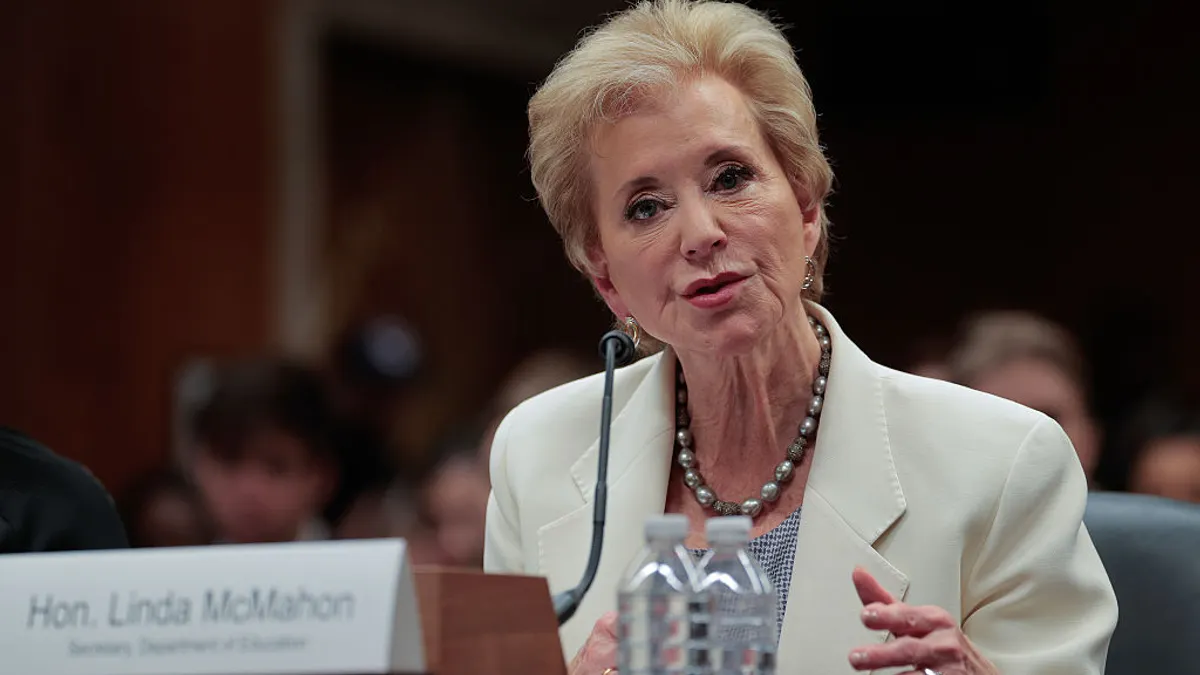Dive Brief:
- The U.S. Department of Education on Tuesday unveiled its proposed accreditation rules, which the federal agency says are meant to foster innovation and give accreditors and colleges more flexibility.
- Critics of the proposal, however, say it will weaken the accreditation system and potentially harm students.
- The public will have 30 days to comment on the rules after they are published in the Federal Register this week.
Dive Insight:
The proposal resulted from a negotiated rulemaking session earlier this year that covered wide-ranging issues in higher education, including accreditation, online education and faith-based schools. Although negotiators reached consensus, some say the Ed Department failed to give consumer protection advocates a seat at the table.
The department's 400-plus pages of proposed regulations would make it easier for colleges to get program approval, give accreditors more leeway over taking action against institutions, and ease federal review of accrediting bodies.
In its published rules, the department contends that "accrediting agencies and the institutions they oversee have too often been forced into regulation-induced conformity." One regulation the proposals take aim at is the so-called "widely accepted" standard, which requires accreditors to get the approval of educators, colleges, licensing bodies and employers.
Some groups favor parts of the broader proposal. Judith Eaton, president of the Council for Higher Education Accreditation (CHEA), said in a statement provided to Education Dive that they include "additional protections for students and advancing innovation." Additionally, they would require colleges to enter arbitration with accreditors before they can sue over disputes, such as revoked accreditation, a provision for which CHEA has "long advocated," Eaton added.
Yet some say the Ed Department hasn’t adequately explained the reasoning behind some proposals. "There is very little evidence to suggest the accreditation system is overly rigorous right now," said Clare McCann, deputy director for federal higher education policy at New America, a bipartisan think tank. "If anything, the accusation tends to be in the other direction."
Indeed, higher ed experts have been calling on accreditors to focus more on student outcomes and to crack down on poorly performing institutions.
"We should be increasing requirements for federally funded schools to show good outcomes for their students, rather than opening up the federal spigot to institutions that are shown to serve students poorly,” Michael Itzkowitz, senior fellow for higher ed at Third Way, a left-leaning think tank, told Education Dive in an email.
Once the public comment period closes, the Ed Department will have to review each response by Nov. 1 in order to issue a final rule that could take effect in 2020. However, that could be too close of a deadline for the agency to respond in a "substantive and satisfactory way," McCann said.
The Ed Department has missed the deadline before when attempting to rewrite the borrower defense and gainful employment rules. Additionally, it is expected to issue two other proposals for regulations around online education and faith-based schools.
"They have shown themselves to have bitten off more than they can chew with the whole suite of regulatory efforts they've undertaken," McCann said.
Hallie Busta contributed reporting to this story.












